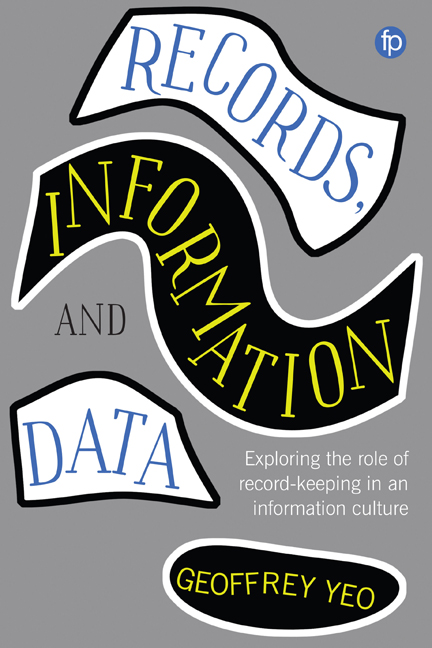Book contents
- Frontmatter
- Contents
- Introduction
- 1 The Making and Keeping of Records: a Brief Historical Overview
- 2 Thinking About Records and Archives; the Transition to the Digital
- 3 Archivists, Records Managers and the Rise of Information
- 4 Finding a Way Through the Hall of Mirrors: Concepts of Information
- 5 Records and Data
- 6 Representation, Performativity and Social Action: Why Records Are Not (Just) Information
- 7 Managing Information or Managing Records?
- Concluding Thoughts: Record-Keeping Present and Future
- Index
4 - Finding a Way Through the Hall of Mirrors: Concepts of Information
Published online by Cambridge University Press: 24 September 2019
- Frontmatter
- Contents
- Introduction
- 1 The Making and Keeping of Records: a Brief Historical Overview
- 2 Thinking About Records and Archives; the Transition to the Digital
- 3 Archivists, Records Managers and the Rise of Information
- 4 Finding a Way Through the Hall of Mirrors: Concepts of Information
- 5 Records and Data
- 6 Representation, Performativity and Social Action: Why Records Are Not (Just) Information
- 7 Managing Information or Managing Records?
- Concluding Thoughts: Record-Keeping Present and Future
- Index
Summary
Introduction
Although in recent decades many archivists and records managers have wanted to characterise records in terms of information, few of them have felt it necessary to examine the possible meaning or meanings of the word ‘information’ or to discuss its significance in any detail. Information is often heralded as a concept that can help to explicate records and archives, but is seldom presented as a concept that may itself be in need of explication. Similarly, advocates of the new discipline of information governance sometimes offer definitions of ‘governance’ but rarely trouble to define the concept of information. Even the Encyclopedia of Archival Science (Duranti and Franks, 2015), which includes entries for ‘information assurance’, ‘information governance’, ‘information management’ and ‘information policy’, has no entry for ‘information’.
Why are records professionals so reluctant to scrutinise a concept that their profession has embraced with such apparent enthusiasm? One possible explanation is that information has proved difficult to delineate. As American philosopher Fred Dretske (1981, ix) remarked, ‘it is much easier to talk about information than it is to say what it is you are talking about’. But the most probable explanation of professional reticence is simply that the word ‘information’ has come to be so widely used in the discourse of contemporary society that most records professionals now perceive it as self-explanatory. We live in an information culture, in which we hear information mentioned so frequently that most of us feel no need to ask what kind of phenomenon it is.
Outside the field of archives and records, however, many scholars and practitioners have recognised that information is not a concept that we can simply take for granted. In the twin disciplines of librarianship and information science, in recent decades, numerous writers have taken up the challenge of elucidating what we might mean when we talk about information. Even a brief inspection of the writings on this subject reveals the scale of the difficulties that Dretske observed; the literature on the meaning of information is extensive but remains largely inconclusive. According to a philosopher of information science, ‘it has become a cliché to note that as many definitions of information have been suggested as there are writers on the topic’ (Furner, 2015, 364).
- Type
- Chapter
- Information
- Records, Information and DataExploring the Role of Record Keeping in an Information Culture, pp. 85 - 104Publisher: FacetPrint publication year: 2018



